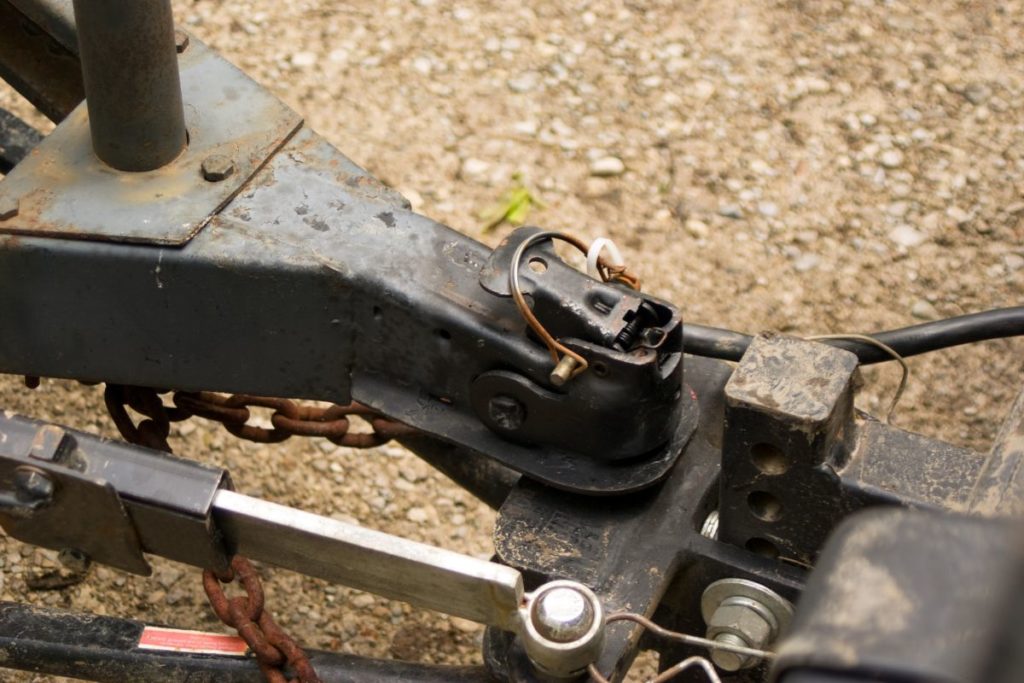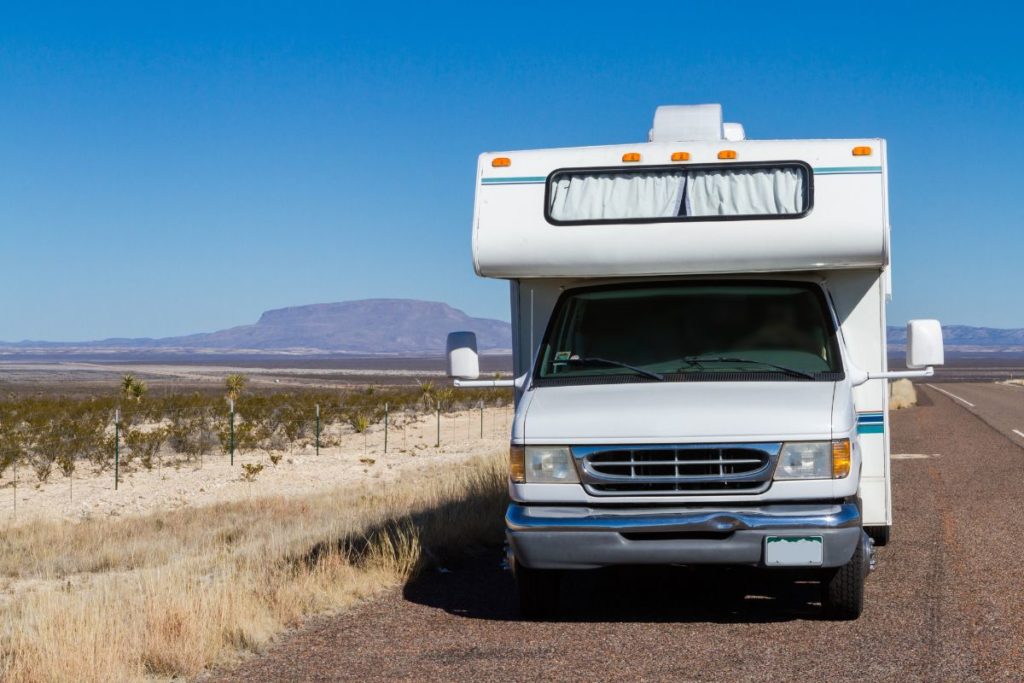*This post may contain affiliate links. As an Amazon Associate we earn from qualifying purchases.
Are you thinking about hitting the open road in your trusty RV and want to tow a minivan behind it? Well, you’re in luck because that’s exactly what we’re going to talk about today!
Towing a vehicle behind a motorhome is a pretty common practice, especially for those of us who like to bring along all the comforts of home on a long road trip. But can you tow a minivan behind an RV? And if so, is it even a good idea?
Yes, an RV can tow a minivan behind it as long as the minivan is equipped with the correct drive train (or you have a trailer you put it on) and the RV is capable of towing the weight of the minivan.
Additionally, it is necessary to use proper tow equipment and follow all relevant safety guidelines while you tow behind your motorhome.
With your motorhome, you can tow a variety of vehicles including a small car (the most popular option), a small truck, a small SUV, and even a minivan. As long as you don’t exceed the weight limit that you can tow with your motorhome and you have the proper trailer to put the vehicle on then you can tow it.
Well, there are definitely a few things to consider before you start hitching up your minivan to an RV and hitting the highway. Let’s dive in and take a closer look at the pros and cons of having a minivan in tow behind your RV.

Can you tow a minivan behind an RV?
Okay, so the first question on everyone’s mind is probably whether or not you can even tow a minivan behind a motorhome. The short answer is: it depends.
In general, a minivan can be towed behind a motorhome on either a flatbed trailer or a dolly. Most minivans cannot be flat towed (with all 4 wheels on the ground) behind a motorhome as rarely are they designed for that.
There are a few factors to consider when deciding whether or not you should tow a minivan behind your RV and if it is a good idea. The most important factor is the weight of the minivan.
Most RVs are equipped to tow vehicles that weigh up to about 5,000 pounds. Now, minivans can vary quite a bit in terms of weight, with some models coming in at under 4,000 pounds and others weighing closer to 5,000 pounds.
So, you’ll need to check the weight of your specific minivan model to see if it falls within the tow capacity of your RV.
In addition to the weight of the minivan, you’ll also want to consider the capacity to tow your RV has. This can usually be found in the owner’s manual or by contacting the manufacturer. It’s important to make sure that your RV is able to safely tow the combined weight of the minivan and any additional cargo you plan on bringing along.

How to properly tow a minivan behind a motorhome
Once you’ve determined that your minivan is able to tow and that your RV is capable of handling the load, it’s time to actually hitch up the two vehicles.
Here are a few things to keep in mind to ensure that the process goes smoothly:
- Use a heavy-duty tow hitch: Make sure to use a tow hitch that is specifically designed to tow a minivan behind a motorhome. This will ensure that the hitch is strong enough to handle the weight of the combined vehicles.
- Secure the minivan to the RV: Use heavy-duty chains or straps to secure the minivan to the RV. Make sure that the chains or straps are tightened properly and that the minivan is evenly balanced on the RV.
- Use a towing dolly: If your minivan is not designed to be flat towed, you may want to consider using a towing dolly. This is a small trailer that the front wheels of the minivan sit on, which is then attached to the RV. This allows you to tow the minivan without putting any strain on the transmission.
- Use a brake controller: If your RV is not equipped with a brake controller, you’ll want to invest in one before you tow your minivan. A brake controller helps to regulate the braking system of the minivan or trailer, ensuring that it stops at the same rate as the RV.
- Practice towing: Before hitting the road, make sure to practice towing the minivan in a safe and open area. This will give you a chance to get a feel for the combined weight and length of the vehicles and make any necessary adjustments.

Advantages of towing a minivan behind a motorhome
Now that we’ve covered the basics of how to tow a minivan behind a motorhome, let’s take a look at some of the benefits of doing so.
Extra storage space
One of the biggest advantages of towing a minivan behind a motorhome is the extra storage space it provides. Even the largest RVs can fill up quickly with all of your travel gear, so having a place to store extra items can be a lifesaver.
More flexibility for travel and sightseeing
Having a minivan in tow behind your RV also gives you the flexibility to leave the RV parked at your campsite while still having a vehicle for local transportation. This can be especially convenient if you’re visiting an area with narrow or winding roads, as it can be difficult to maneuver an RV in these situations.
Ability to leave the RV parked
In addition to providing a means of local transportation, towing a minivan behind your RV also gives you the option to leave the RV parked while you go out and explore. This can be a nice change of pace, especially if you’re used to driving the RV everywhere.
Disadvantages of towing a minivan behind a camper
Of course, deciding to tow a minivan behind a motorhome isn’t without its drawbacks. Here are a few things to consider:
Increased weight and length of the combined vehicles
Towing a minivan behind your RV will obviously increase the weight and length of the combined vehicles. This can make it more difficult to maneuver in tight spaces and may require you to pay closer attention to your surroundings when driving.
Higher fuel consumption
Towing a vehicle behind a motorhome will also increase the amount of fuel you use. This is because the added weight of the minivan puts additional strain on the RV’s engine, resulting in higher fuel consumption.
Potential for damage to the minivan from the RV towing process
While having a minivan in tow behind an RV is generally safe, there is always a risk of damage to the minivan during the towing process. This could be due to rough roads, improper securing of the minivan, or other factors. It’s important to be mindful of this risk and take steps to minimize it as much as possible.
Alternative options for a tow car behind an RV
Although you can tow a minivan with an RV, if towing a minivan with your RV isn’t a viable option for you, there are a few alternative options to consider.
Renting a car at your destination: If you don’t want to deal with the hassle of learning how to tow a vehicle or setting it up, you could always consider renting a car at your destination. This allows you to have a vehicle for local transportation without the added weight and length or worry about getting the tow kit figured out.
Using a hitch-mounted cargo carrier: Another option is to use a hitch-mounted cargo carrier to bring along additional gear and supplies. These carriers attach to the back of your RV and provide extra storage space without the added weight and length of towing a vehicle.
Bringing along a bike or motorized scooter: If you don’t need a lot of storage space and just want a way to get around locally, you could consider bringing along a bike or motorized scooter. These smaller modes of transportation are easy to store and can be a fun way to explore your destination.
Safety considerations when towing a minivan behind an RV
No matter which option you choose for to tow vehicle behind your RV, safety should always be a top priority. Here are a few things to keep in mind:
Properly securing the minivan to the RV: As we mentioned earlier, it’s important to use heavy-duty chains or straps to secure the minivan to the RV. Make sure that these are tightened properly and that the minivan is evenly balanced on the RV.
Maintaining proper following distance: When towing a minivan with an RV, it’s important to maintain a proper following distance. This allows you more time to react to any unexpected events on the road and can help to prevent accidents.
Paying attention to weather and road conditions: As with any road trip, it’s important to pay attention to the weather and road conditions when towing a minivan with an RV. Make sure to drive at a safe speed and take any necessary precautions in adverse weather conditions.
Does Towing A Car Behind An RV Damage It?
Well, let me tell you, folks, this is a question that’s been plaguing me for years. I mean, it’s not like I’m some kind of tow expert or anything, but I’ve seen enough cars being towed behind RVs to know that it’s a bit of a touchy subject.
First of all, let’s start with the basics. Yes, if you decide to tow a car with an RV can damage it. That’s right, folks, it’s not just a myth.
But don’t worry, it’s not like the car is going to fall apart the minute you hit the highway.
It’s just that over time, the constant bouncing and jostling can cause some damage to the car’s suspension and transmission. But hey, who needs a smooth ride when you’re living life on the road, right?
Now, let’s talk about the different types of towing. There’s flat towing, where the car’s wheels are on the ground, and then there’s dolly towing, where the front wheels are lifted off the ground. Both have their pros and cons, and neither is perfect.
Flat towing is great for ease of use, but it can be rough on the car’s suspension. Dolly towing is a bit gentler, but it can be a hassle to set up and take down. And let’s not forget the added expense of purchasing a dolly in the first place.
Of course, you can also put your entire minivan (or car) up on a trailer and tow it that way. In that case, it won’t be experiencing many of the bumps of the road (since the trailer will be absorbing most of them) so you should save your vehicle’s suspension at least a little bit when you tow your car using a trailer.
So, how do you protect your car while you tow it with an RV? Well, first and foremost, you want to make sure that your RV is equipped with a weight distribution hitch. This will help distribute the weight of the car evenly and reduce the impact on the car’s suspension.
You also want to make sure that the car is securely attached to the RV, and that the tow bar is in good condition. And don’t forget to take breaks often, to give the car a chance to rest and recover.
Now, let’s talk about some of the misconceptions when you tow a car with an RV. For example, some people think that when you tow a car will automatically void its warranty. This is simply not true.
However, if the car is damaged while being towed, and the damage is due to a manufacturing defect, then the warranty may be voided.
Another myth is that towing a car with an RV is illegal. This is also not true. However, there are certain regulations that must be followed, such as the length of the tow bar, the weight of the car being towed, and the speed at which the RV and car are traveling.
So, in conclusion, towing a car with an RV can cause damage, but it’s not the end of the world. With proper preparation and equipment, you can minimize the impact on your car.
And let’s not forget, towing a car with an RV is a great way to take your car with you, without having to worry about parking or paying for rental cars. So, grab your RV, hit the road, and live life to the fullest.
Does Towing A Car Behind An RV Put Miles On It?
First of all, let’s start with the basics. Yes, towing a car with an RV will put miles on it assuming you are flat towing it (if it has a manual transmission) or towing it on a dolly (if it’s a rear-wheel drive car). However, if you are towing a car up on a trailer or if it is front-wheel drive and its front wheels are stationary on a dolly then its mileage won’t go up.
That’s right, folks, it’s not just a myth. The vehicle will accumulate miles as it travels behind the RV (depending on the way it is towed), and these miles will show up on the car’s odometer. And let me tell you, nothing says “I’ve been around the block” quite like a vehicle with a lot of miles on it.
Now, let’s talk about the different types of towing. There’s flat towing, where the car’s wheels are on the ground, and then there’s dolly towing, where the front wheels are lifted off the ground. Both have their pros and cons, and neither is perfect. Flat towing will put miles on your vehicle, but dolly towing won’t (if it is front-wheel drive).
So, how do you keep the miles on your vehicle to a minimum while towing it with an RV? Well, the best way to minimize the miles on your vehcile is to drive as little as possible. I know, I know, this sounds crazy. But the more you drive, the more miles you’ll put on your vehicle.
You can also reduce the mileage you add to your vehicle by purchasing a towing dolly or even an entire vehicle trailer.
Now, let’s talk about some of the misconceptions about towing a vehcile with an RV. For example, some people think that towing a vehicle will not affect the odometer. This is simply not true.
The miles that your vehicle accumulates while being towed will show up on the odometer, just like any other miles (if its drive wheels are on the ground while being towed behind the RV). B
Another myth is that towing a vehicle with an RV will cause the car’s engine to wear out faster. This is also not true. The car’s engine will run just as it normally would, and it won’t be affected by the miles that it accumulates while being towed.
So, in conclusion, towing a vehicle with an RV will put miles on it in some cases but won’t in others. So, with proper preparation and a little bit of caution, you can minimize the impact on your car’s odometer.
And let’s not forget, towing a vehicle behind an RV is a great way to take your vehicle with you, without having to worry about parking or paying for rental cars.
Are Tow Dollies Safe?
Tow dollies can be safe if used properly and maintained regularly. It’s important to follow the manufacturer’s instructions and guidelines for using the tow dolly, as well as regular inspections and maintenance to ensure that it is in good working condition. Additionally, it’s important to secure the vehicle being towed correctly to the dolly to avoid any potential accidents.
Can You Flat Tow A Minivan?
Yes, you can flat tow a minivan. However, it is important to check the manufacturer’s guidelines and recommendations to make sure your specific make and model is suitable for flat towing. Additionally, it is necessary to have the proper equipment and setup for safe and secure flat towing.
Final Thoughts
So, can you tow a minivan behind an RV? The answer is: it depends. There are a few factors to consider, including the weight of your tow car and the towing capabilities of your RV, as well as whether the minivan is designed to be flat towed or needs to be on a car hauler or dolly.
If you do decide to tow a minivan behind your RV, make sure to follow proper safety precautions and be mindful of the added weight and length of the combined vehicles.
Deciding to tow a minivan behind an RV can be a convenient and practical option for travelers, but it’s important to carefully consider the factors involved and prioritize safety. Whether you decide to tow a minivan, rent a vehicle at your destination, use a hitch-mounted cargo carrier, or bring along a bike or scooter, the most important thing is to find a solution that works for you and your travel needs.
